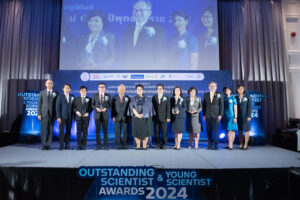 August 15, 2024 –Dr. Kallaya Sritunyalucksana-Dangtip is being recognized by the Foundation for the Promotion of Science and Technology under the Patronage of His Majesty the King. Held at the Centara Grand at Central Plaza Ladprao, the award ceremony was presided over by H.E. Supamas Isarabhakdi, Minister of Higher Education, Science, Research and Innovation.
August 15, 2024 –Dr. Kallaya Sritunyalucksana-Dangtip is being recognized by the Foundation for the Promotion of Science and Technology under the Patronage of His Majesty the King. Held at the Centara Grand at Central Plaza Ladprao, the award ceremony was presided over by H.E. Supamas Isarabhakdi, Minister of Higher Education, Science, Research and Innovation.
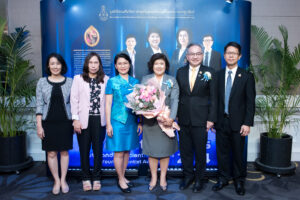
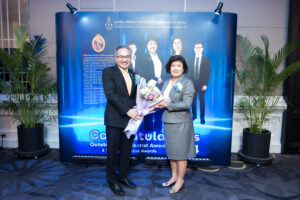 |
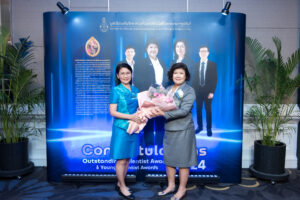 |
With extensive experience in shrimp health, Dr. Kallaya is ranked second among Fisheries Scientists in Thailand and 57th in Asia. Her work has earned her a spot among the top 2% of global scientists in fisheries between 2019 and 2022. Moreover, Dr. Kallaya’s achievements have been acknowledged internationally, including the L’Oréal-UNESCO For Women in Science award in 2007, the Newton Prize (Chairman’s Award) in 2018, and the High-Potential Research Team Grants from the National Research Council of Thailand (NRCT) and NSTDA in 2022.
Her pioneering research has greatly enhanced our understanding of shrimp pathogens and diseases, leading to practical solutions that have an impact on shrimp farming in Thailand and other countries.
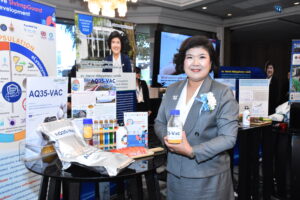
One of Dr. Kallaya’s notable achievements is her work on combating Early Mortality Syndrome (EMS), a devastating disease that caused a dramatic decline in shrimp production in Thailand. Dr. Kallaya and her team were the first to identify the specific strain of Vibrio parahaemolyticus as the cause of EMS, leading to the development of the AP4 PCR detection method. This highly sensitive method, which was made available to the public, has been widely adopted by shrimp farmers for screening and monitoring, significantly reducing the risk of EMS outbreaks. The economic impact of her research has been substantial, contributing over 329 million baht to Thailand’s economy in 2019 alone.
In addition to her work on EMS, Dr. Kallaya has made significant contributions to understanding and controlling Hepatopancreatic Microsporidiosis (EHP), another major threat to shrimp health. Her research has shed light on the life cycle and infection mechanisms of EHP, leading to practical control measures that are now applied worldwide. Her contributions have helped mitigate the economic losses caused by EHP, estimated at $76.4 million between 2014 and 2018.
Dr. Kallaya’s research into shrimp immunity has also been impactful. She has provided insights into the innate immune system of crustaceans, including the prophenoloxidase (proPO) system, and has developed methods for regular immune monitoring in shrimp. Her work on persistent viral infections, particularly the discovery of endogenous viral elements (EVE), has opened new avenues for breeding viral-resistant shrimp, offering hope for more sustainable shrimp farming practices. Furthermore, Dr. Kallaya has played a crucial role in the development of specific pathogen-free (SPF) Penaeus monodon broodstock through selective breeding programs. Her expertise in pathogen detection and shrimp health contributes to the production of shrimp with high growth rates and disease resistance, greatly reducing the risk of disease outbreaks in shrimp farms.
In addition to her scientific achievements, Dr. Kallaya has played a key role in building a strong network of stakeholders both nationally and internationally. She was a key figure in establishing the International Network for Shrimp Health (INSH), which has successfully bridged the gap between research, policy, and industry. Her efforts have earned international recognition, including the Newton Prize Chairman’s Award in 2017.
